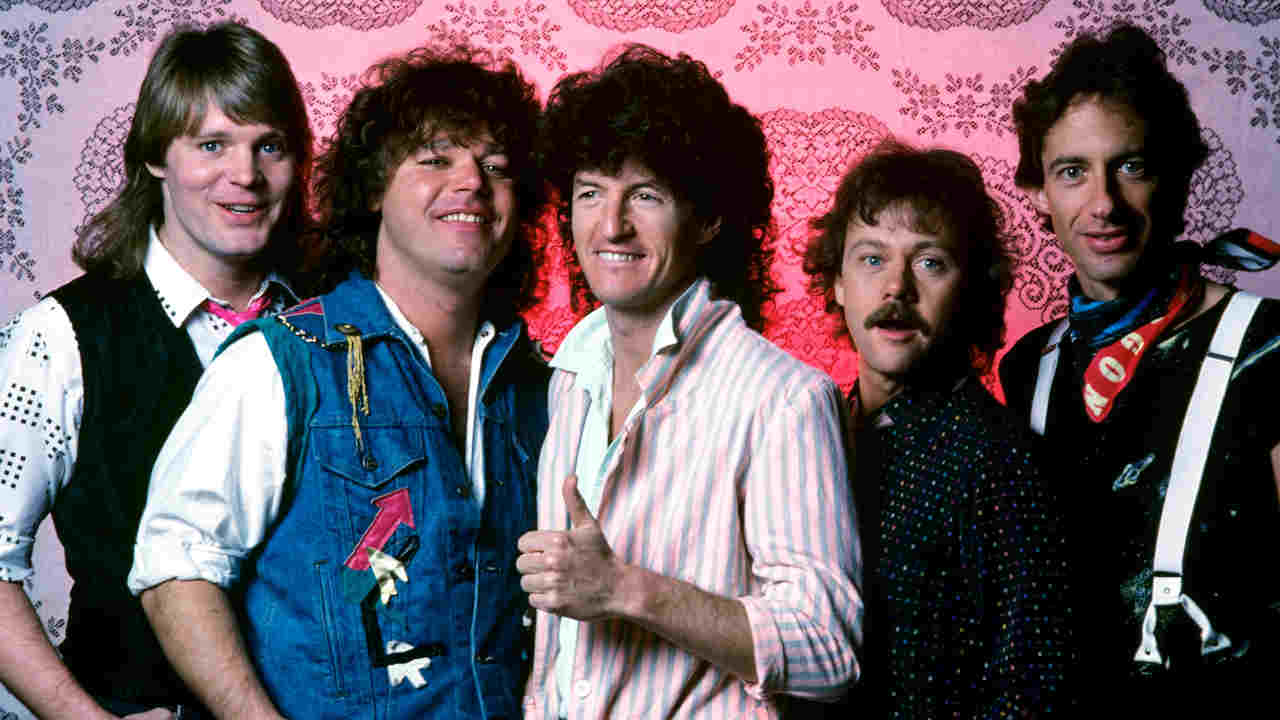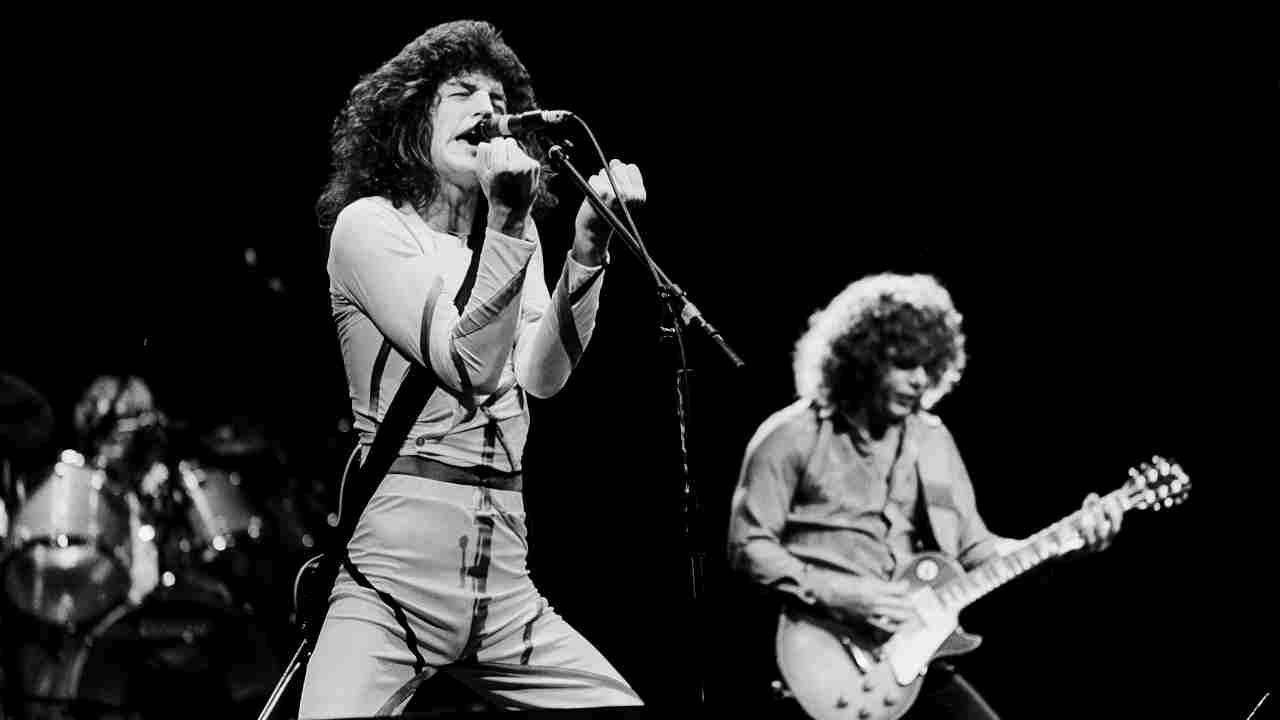A current bust up between longtime REO Speedwagon singer Kevin Cronin and the band’s founding bassist (and sole remaining authentic member) Bruce Corridor has successfully marked the top of the arduous rock veterans as a touring band. However arduous occasions weren’t a brand new factor within the Speedwagon story, as Basic Rock found after we spoke to the pair across the launch of their fifteenth studio album, Discover Your Personal Approach Residence, in 2007.
With document gross sales topping 40 million, for a short interval within the early Nineteen Eighties REO Speedwagon have been the preferred band in America. And probably the most reviled.
The Physician Frankensteins of the modern ‘energy ballad’, a saccharine mixture of gooey love-song fluff and overwrought arduous rock guitars, REO shot to the highest of the charts with timeless monster hits like Hold On Loving You and Can’t Combat This Feeling and paved the way in which for the countless stream of girl-baiting, chart-smashing smooth hits from the glam steel brigade 5 years later. Suffice to say that have been it not for REO, we’d by no means have had bands like Firehouse, Excessive, Slaughter or White Lion. Whether or not that’s be a blessing or a curse is fully as much as you, however REO’s pioneering work lingers on, even at present. The gross sales they spurred in disposable lighters to wave at concert events alone would boggle the thoughts.
However there’s extra to REO then the ability ballad and the squeaky-clean, Midwestern nice-guy picture. Beneath the tooth-dissolving sweetness of their poppier hits lies a never-say-die work ethic that has weathered 30 years of adversity. From their salad days within the early Nineteen Seventies as a scrappy, Purple-powered arduous rock band slogging from one Midwest bar to the subsequent, to the enormo-domes and arenas of their Hello-Infidelity period, and again to trenches of their leanest years within the Nineteen Nineties, REO Speedwagon have endured. No flash-in-the-pan musical development, no jarring personnel shake-up, no quantity of crucial disdain can topple them. They’re, at their core, an genuine, heads-down, no-frills rock’n’roll band, with simply as many tales of woe and moments of blinding glory as any of the flashier 70s rock survivors. There was cash to burn and addictions to feed, chart-topping singles and a sluggish, painful descent again to bar-band standing; the perils of rock’n’roll decadence didn’t move over the ’Wagon.
“It was 1978. We have been headlining an outside present in Kansas Metropolis; it was at a baseball stadium. Ted Nugent and Fleetwood Mac have been opening up for us,” says REO frontman Kevin Cronin. recalling how the band’s first hit, Using The Storm Out, as soon as took a prophetic flip, and taught the band a lesson in resolve that they continued to hold with them.

“It was raining all day, simply depressing. By the point we went on it was actually unhealthy. There was thunder, lightning. The promoters have been truly making an attempt to speak us out of occurring as a result of it was too harmful. However we went on. I figured, nicely, we may get the plug pulled on us at any time, so let’s play Using The Storm Out first. So we went out, performed it, and someplace throughout the track all of the lights exit. There’s 40,000 folks which were rocking out all day, in varied acknowledged of inebriation, and the lights exit. The scoreboard was nonetheless working, they usually put up a warning on it for everybody to get down from the stands as a result of a twister had simply touched down two miles from the stadium.
“So we’re standing on the aspect of the stage making an attempt to determine what to do. The managers and the promoters simply need to name it an evening, however there’s 40,000 folks on the market who’ve simply been informed {that a} twister has touched down two miles away, they usually’re nonetheless screaming ‘REO! REO!’ They weren’t going anyplace.
“The one energy I had was a flashlight, and I held it over my head so the viewers may see me. They went fuckin’ bananas; they knew we weren’t gonna go away ’em. A band with a track referred to as Using The Storm Out doesn’t wimp out, we do the gig. They lastly bought the ability again up, and we performed. And no person left.”
Using The Storm Out was the standout observe on 1977’s You Get What You Play For, a profitable dwell album that saved REO from shedding their long-standing contract with Epic Information. Though the band from Champaign, Illinois had a stranglehold on the Midwest nearly since their inception in 1967, they’d but to make any breakthroughs in the remainder of the nation. Their oddly titled 1978 album You Can Tune A Piano However You Can’t Tuna Fish spawned their first High 40 hit within the form of Roll With The Adjustments, and the band started to select up steam. At this level REO have been nonetheless thought-about a tough rock band, however singer Kevin Cronin, whose background was as a folks singer, was about to usher in some new musical concepts.
“After I wrote Hold On Loving You I had no concept,” Cronin laughs. “I got here into the studio and performed that track on the piano, and when you may see the look on my band’s face. They checked out me like I used to be out of my thoughts. I imply, initially that track had extra to do with Mandy by Barry Manilow than it did with Deep Purple, that’s for positive. However I simply mentioned to our guitarist, Gary Richrath: ‘Simply plug in, flip it up, and see what occurs.’ And that was the breaking level, proper there: my little ballad, the ability of Gary’s guitar, and the drums are available on the refrain. There it was. That document went to No.1 so quick it made our heads spin.”
Hold On Loving You was certainly one of six hit singles on 1980’s Hello-Infidelity album. Though its instant follow-up, 1982’s flawed Good Bother, didn’t carry out in addition to the band anticipated, 1985’s Wheels Are Turning shot them again to the highest of the charts with the No.1 single Can’t Combat This Feeling. For nearly half a decade, REO Speedwagon have been monsters of rock, with all the cash and fame they may deal with.
“It’s fairly intoxicating,” Cronin remembers. “You begin to suppose you are able to do something you need to do. So all of the sudden it turns into all about self-discipline. It’s very easy to not purchase that bag of cocaine when you possibly can’t afford it. However when you possibly can and it gained’t even make a dent in your funds, you’re like: ‘Certain, I’ll take that. Hell, I’ll take two!’ That was a harmful mixture: youth and an excessive amount of cash.”

REO Speedwagon bought so large so quick that they even had their very own airplane, the legendary Flying Tuna. “We have been so loopy again then. We’d keep up all night time at lodges, ingesting, partying, chasing ladies – and our pilot was proper there with us. The subsequent morning after we have been all recovering, he was flying the airplane! I’ll always remember, we’d are available for a touchdown, the airplane would financial institution, and also you’d hear Heineken bottles rolling round within the cockpit.”
Such Zeppelin-like situations are a placing distinction to the unblemished public face REO displayed in numerous tv and radio appearances on the top of their success. Cronin chalks it as much as figuring out when to place the bottle down, however admits that “the truth of life on the highway with REO was enormously at odds with the picture we portrayed.”
Because the Nineteen Eighties wore on, REO’s vivid star started to fade, and dissension throughout the band set in. A significant turning level within the band’s profession occurred in 1988, when long-time guitarist Gary Richrath – thought-about by many to be the center of REO Speedwagon – stop. Whether or not he did so of his personal accord or was requested to depart remains to be open to debate, however the finish consequence left the band as shut because it ever was to dissolving (Richrath handed away in 2015(.
“It was the 80s. A few of us made it by, and a few of us didn’t. I’ll go away it that,” REO’s long-time bass participant Bruce Corridor says. “However that was positively a kind of factors the place we questioned whether or not we should always hold doing this or not.”
Cronin agrees. “After Gary left, I wasn’t positive if the band was even going to go on. I used to be actually pondering of calling it a day. I bear in mind at some point our supervisor mentioned to me: “We should always most likely not be paying for the storage for all of the REO tools. We should always simply promote all that stuff and quit the warehouse.” That actuality hit me like a left cross. I wasn’t able to let go of it but. The spirit of REO is that we hold taking part in, by rain, by tornadoes – we don’t hand over.”

The band began once more from sq. one. They introduced in a brand new guitarist, Dave Amato, and in 1990 launched the album The Earth, A Small Man, His Canine, And A Rooster, then proceeded to play anyplace they may get a gig. Anyplace in any respect – even soccer stadiums in Columbia, opening for Milli Vanilli.
“It wasn’t Milli Vanilli, it was the ‘actual’ Milli Vanilli,” Cronin corrects. “This was after the scandal, after they’d their Grammy taken away. So now, it was 1992. After I heard we have been booked in Columbia, I believed there have been going to be machine-gun nests in every single place. I used to be like: ‘Are you fuckin’ kidding me?’
“Anyway, that tour was a excessive level for us in these days,” he laughs. “We have been taking part in some shit gigs. For a band that had performed Madison Sq. Backyard 10 years earlier than, taking part in bars in New Jersey and nation festivals was an actual wake-up name.”
This Spinal Faucet-ish flip of occasions resulted in a heap of nasty press on the time from hipper-than-thou critics, however Cronin was undaunted. “I by no means felt vengeful about something unhealthy folks wrote about us, though it did harm my emotions typically,” he says. “Now it’s similar to the previous adage: I don’t care what you say so long as you spell my title proper.”
In 1996, after their then-label, Precedence, went bankrupt, REO self-released the politically charged Constructing The Bridges. It did not do a lot enterprise, so the band focused on releasing biggest hits packages, a shrewd transfer that finally constructed their core viewers again up. They’ve been touring seasonally ever since, and with the discharge of their new album Everybody Loves A Completely happy Ending the band are able to change into full-time rock stars once more.
Bassist Bruce Corridor is philosophical about all of it. “We’re musicians, so what else are we gonna do? We’re simply gonna hold taking part in. In the event you get to strap in your guitar and play some songs, and persons are prepared to pay you for it, you then’re a fortunate man.”
Initially printed in Basic Rock journal concern 107, Might 2007
